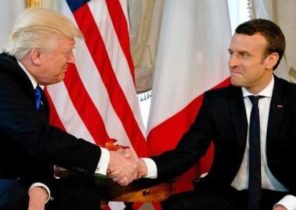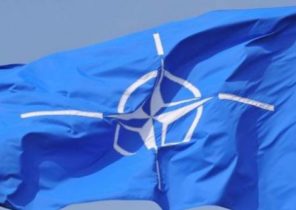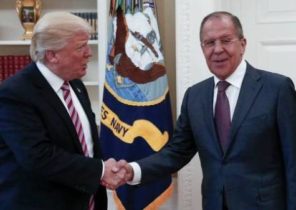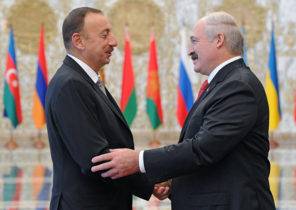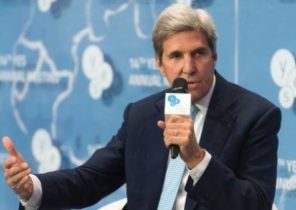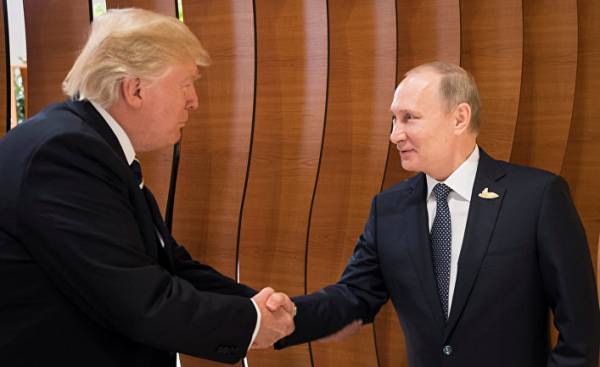
President trump has made a lot of mistakes on Friday during the meeting with Vladimir Putin, and you can start with the fact that, according to him, for it was “an honor” to meet with Russian power politics.
However, the most disconcerting outcome of this meeting is that trump and his Secretary of state, Rex Tillerson, as previously Barack Obama and John Kerry, fundamentally do not understand the nature of the person with whom they are dealing. Putin is “unpredictable” ornery, “a bored kid in the back row in class” as it is called Obama, or stupid, but hindering all opponents. Trump Putin delivered the top score for leadership, but, apparently, he had been thinking over where Putin is leading Russia and why.
However, there’s no mystery there. Putin is a Soviet patriot to the bone, and he is guided by deep-rooted beliefs specified by the historical mission and political imperatives. The inability of successive American presidents to draw the right conclusions has a long history and affects the current situation: we misunderstood Putin from the moment he first gained power almost two decades ago.
Putin believes that the collapse of the Soviet Union caused by the conspiracy abroad and treachery in the country, was deeply unfair and immoral — “the greatest geopolitical tragedy of the XX century” — and therefore the West needs to take revenge for it, first and foremost the United States. He believes that the world order established after the cold war was unjust and immoral, especially in conditions of a “unipolar” dominance of the United States, and so the balance it needs to be changed in the course of the zero-sum game in which the West will lose — whether in Syria, Iran or North Korea, and Russia will win.
Putin understands that the Russian economy is suffering from toxic domestic investment climate, from excessive amounts of state ownership and state control, and corruption, unconscionable and widespread bureaucratic racketeering, and so his popularity (as well as the legitimacy of his state, which in all other respects have many causes disgust) depends almost exclusively on its ability to maintain the Patriotic mobilization through ongoing advocacy updates to the meta-narrative concerning the protection of the homeland and the restoration to Russia of the glory of the superpower, which had the Soviet Union, that is, in his opinion, to do so, to you in the world feared, and therefore respected.
While in the analysis of Putin benefit continues to exceed the costs (at present, in one form or another do), he will continue to act on the basis of their beliefs and to save his regime through foreign adventures and haphazard internal reforms. He doesn’t want to be loved in the West. He wants to stay in power in Russia.
Trump had to do two things at the summit with Putin: he had to submit to the Russian President a detailed and unvarnished picture of the Russian assault on the national interests of the United States. Speech, in particular, about the security of our allies, the respect the independence of former Soviet States, as well as on the implementation of the norms of international conduct. Also — more importantly — the goal of tramp was to present Putin vivid, compelling and credible description of what will be its current behavior, and what benefits she can get if she will behave more cautiously.
The impression is that trump is not affected by any (or almost none) of the key concerns of the United States. But judging by that leaked from the black box, then the second part of the work has not been executed — a combination of myopia, moral stupidity and complete ignorance has made every effort at best useless, and at worst — and this option is more likely — harmful.
The results of the meetings began to take definite form with the moment when trump said that for him “it’s an honor to meet” with Putin. After the election, trump had spent at least half a dozen meetings at the highest level, however, as far as we know, none of his interlocutors — including the leaders of such close allies as the United Kingdom and Israel, and also India, the largest democracy — has not received such a high status.
However, with Hamburg winning in a free election, the chief Executive of the world’s oldest continuously functioning democracy, occupying a leading place in the field of technology and democracy, considered for the “honor” to hold a meeting with the imperious leader from repressive autocracies, half of whose budget is provided by oil and natural gas; this country is among the most corrupt regimes in the world. According to the latest data, 15% of the population (22 million people) earn less than “living wage” (meaning that they did not have enough money for food); this is a country where one man ruled for 17 years.
Partner of trump in the negotiations in Hamburg is busy with preparations for the next year, their fourth Potemkin re-election and intends to extend the existing dictatorship for another six years, and then in 2024 it will be compared with Stalin at the time of his reign.
In the same moral fog of amnesia (or ignorance) the Secretary of state Tillerson, asked after the meeting to journalists, said: “We are unhappy, they’re unhappy” — but let’s just move forward.
“They” are bombing hospitals in Syria and are fighting to keep in power the person of poisonous sarin his people. “They” invaded and annexed a significant part of European countries. “They” unleashed a seemingly endless war in Europe, which has killed 10 thousand people. “Their” missile brought down the plane of Malaysian airlines flight MH17, killing 298 people. “They” in the last 10 years have made hacking attacks on government agencies and other organizations in the United States, U.S. allies, and the newly independent States of Eastern and Central Europe. Well, what “we”? Well, “we” probably have done something equally bad. So what’s the difference? Dissatisfaction is the dissatisfaction with “their” dissatisfaction is as important as ours.
As for areas of concern to the United States, according to the Minister of foreign Affairs Sergey Lavrov to its accuracy, no one on the American side, no doubt, — trump “did not have any specific plan” to “resolve the Ukrainian crisis.” Instead, the President of the United States reaffirmed its “commitment” to the agreement Minsk-2. (It was signed by Russia, Ukraine, and mediated by Russian forces in February 2015 under the auspices of France and Germany, and almost immediately I began to break down. It calls for an immediate ceasefire, restoration of Ukraine’s border with Russia, the withdrawal of Russian troops from the Donetsk and Lugansk regions).
Thus the President of the United States was signed under the Kremlin’s version of reality in which “aggression” and “occupation” are “crisis” and approved of attempts to fit a dead horse in the form of “Minsk agreements”, while Russia consolidates its acquisition in occupied territory, killing Ukrainian soldiers and possibly preparing for another large-scale attack on Ukraine and neighboring Belarus.
Trump welcomed the agreement on ceasefire in the South-East of Syria, calling it a big breakthrough. Unlike such arrangements in the past — they were all violated by the Assad regime and its supporters Russia and Iran — the current truce, according to Lavrov, will be provided by Russian military police. In this case, it will be the first official approval from the United States the Russian presence in Syria.
However, don’t fret — according to Tillerson, “basically our objectives (in Syria) are identical”. The good news, of course, but not quite clear — does this mean that the United States now mostly support Assad? Or Moscow has switched sides, abandoning their Alliance with Assad and Iran?
As the range of North Korean missiles is increasing and getting closer and closer to the shores of the United States, Putin, apparently, is not backing down from its position on the protection of Pyongyang and continues to veto new UN sanctions, as he did shortly before the summit in Hamburg, because Russia said Tillerson, “sees things a little differently than we are.” He also said that “the United States will continue to try to persuade Russia” on the issue.
And finally, when it comes to Russian hackers, some American officials — but not the President himself, it should be noted — disputes the assertion Lavrov that trump has taken a rebuttal to Putin of Russian involvement. But then, according to Tillerson, trump and Putin discussed how the two countries will “ensure the commitment of Russia with respect to the absence of her” intentions to interfere in future elections. In addition — as if the strangeness wasn’t enough — both the President, according to Lavrov, agreed that “these issues will become the subject of bilateral cooperation”, and that this end will set up a special “working group”. Thus, even if trump doesn’t “acknowledged” the innocence of Russia, it is in Hamburg agreed to invite the robber to “work” together with the house owner.
The President of the United States today claims that he and Putin discussed the idea of creating a U.S.-Russian working group on cyber security and that it “can’t happen” — don’t pay any attention to what his Finance Minister just hours earlier called this proposal a great achievement.
“You should make Khrushchev was sure that you — a man who will fight!” — so the clever French President Charles de Gaulle counseled John F. Kennedy before his disastrous summit with the first Secretary of the (CPSU), Nikita Khrushchev in Vienna in June 1961. Kennedy ignored the advice and chose to bet on their charm and charisma. Khrushchev, who during the previous three decades was raised on the dirty (and very bloody) pole to the top of the Soviet power, was not particularly impressed. A year later he decided to place missiles in Cuba with nuclear warheads.
Although the ascent of Putin was not so long nor so bloody, he is also a tough nut to crack. Street urchin from the slums of postwar Leningrad, he grew up in extreme poverty in the “communal apartment”, the kitchen which had to be shared between the 11 families, and the toilet was on the landing. Every day he had to demonstrate its willingness to fight to gain respect from older guys (and to make them more to him not quibble). “I specialize in dealing with people” (This phrase is given in the article in Russian — approx. TRANS.) the way Putin answered the question of what exactly region he considers himself an expert. And as long as outside the country, and in it he confirms that statement. Flattery expressed by the words, “I am honored to meet you,” gave no results.
“Pierce the abscess” is the expression used my favorite Professor at Columbia University, the late Zbigniew Brzezinski (he was a national security Advisor to President Carter), which I really miss today. He described the situation that require direct and harsh talking to allies and enemies knew about the “position” of the United States, in terms of rewards for good behavior and punishment for bad.
Last Friday, trump was able to open the abscess the Russian. Instead, he and Tillerson used painkillers, sedatives and absolutely indifferent substances that mimic drugs. Soon the abscess will become more and more darker.
Leon Aron is a staff researcher and head of Russian studies at the American enterprise Institute (American Enterprise Institute).
